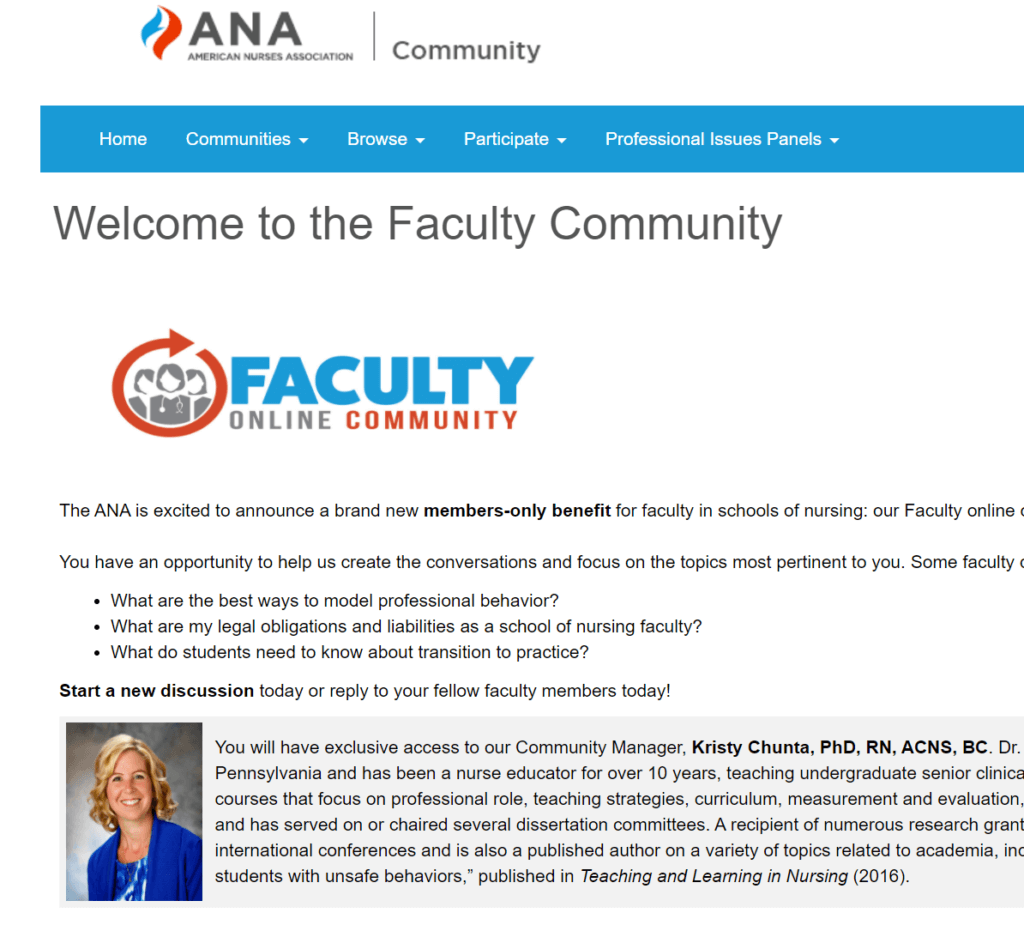If you take pleasure in teaching nurses new concepts and skills and derive job satisfaction from helping them learn and grow, then a career as a Nurse Educator might be for you. There are many possible avenues to consider. Nurse Educators work in both clinical settings and in academic settings.
Overview

How do I prepare myself to become a Nurse Educator?
If you are drawn to educating nurses in a clinical practice environment, preparing to specialize in professional development is an excellent next step. It’s a good idea to gain some teaching experience in your current role by offering to present education to co-workers and by becoming a preceptor for new staff. Another great way to gain experience is to teach standardized courses like CPR to health care professionals or the lay public. These actions will help you develop teaching skills and build a strong education-oriented resume. Also, assess your educational preparation. Bachelor’s preparation in nursing is frequently required for hire as a Nurse Educator. Some employers may encourage or even require Nurse Educators to return to school to achieve master’s preparation in nursing education or another nursing specialty.
What can I expect in a Nurse Educator role?
 As a Nurse Educator, you could be assigned responsibilities in the hospital-at-large or you could be dedicated to a specific nursing unit or practice setting. Some educator positions are a blend of both. You can typically expect to orient and mentor newly hired staff, as well as provide education for ongoing professional development and clinical competency. Topics might include patient care strategies, the proper use of equipment, new expectations, and updated standards of nursing practice. Nurse Educators frequently lead classrooms and teach in formal and informal settings. Some Nurse Educators have joint faculty appointments where they serve as instructors in schools of nursing while they also remain employed in a health care setting.
As a Nurse Educator, you could be assigned responsibilities in the hospital-at-large or you could be dedicated to a specific nursing unit or practice setting. Some educator positions are a blend of both. You can typically expect to orient and mentor newly hired staff, as well as provide education for ongoing professional development and clinical competency. Topics might include patient care strategies, the proper use of equipment, new expectations, and updated standards of nursing practice. Nurse Educators frequently lead classrooms and teach in formal and informal settings. Some Nurse Educators have joint faculty appointments where they serve as instructors in schools of nursing while they also remain employed in a health care setting.
Nurse Educators are valuable clinical resources to all and work with the nursing leadership team to consistently elevate the level of nursing care provided. ANCC offers a certification exam, Nursing Professional Development Certification-Board Certification (NPDC-BC), for nurses who are educators in clinical practice. Becoming board certified in nursing professional development is a mark of professional excellence that can elevate your career as a Nurse Educator.
What if I want to teach students in a school of nursing?
 If academia stokes your passion and you enjoy working with nursing students and those seeking advanced degrees, then becoming a nursing faculty member is an ideal choice. It may be a great next step as a career option for Nurse Educators who wish to transition from a health care setting to working for a college or university. There are advanced degree requirements and expectations, including doctoral preparation for most academic teaching roles. Career paths in academia include such choices as becoming a classroom instructor with master’s preparation, an academic clinical instructor who takes nursing students into the clinical sites, to a professor of nursing who is prepared at the doctoral level and has teaching and research or other academic responsibilities. These positions are in great demand to support a growing nursing workforce.
If academia stokes your passion and you enjoy working with nursing students and those seeking advanced degrees, then becoming a nursing faculty member is an ideal choice. It may be a great next step as a career option for Nurse Educators who wish to transition from a health care setting to working for a college or university. There are advanced degree requirements and expectations, including doctoral preparation for most academic teaching roles. Career paths in academia include such choices as becoming a classroom instructor with master’s preparation, an academic clinical instructor who takes nursing students into the clinical sites, to a professor of nursing who is prepared at the doctoral level and has teaching and research or other academic responsibilities. These positions are in great demand to support a growing nursing workforce.
Recent Posts
Individual Development, Leadership / Management, Nurse News, Nursing Initiative, Technology
While there are many opportunities for nurses to meet the needs of vulnerable populations, incorporate the social determinants of health,















